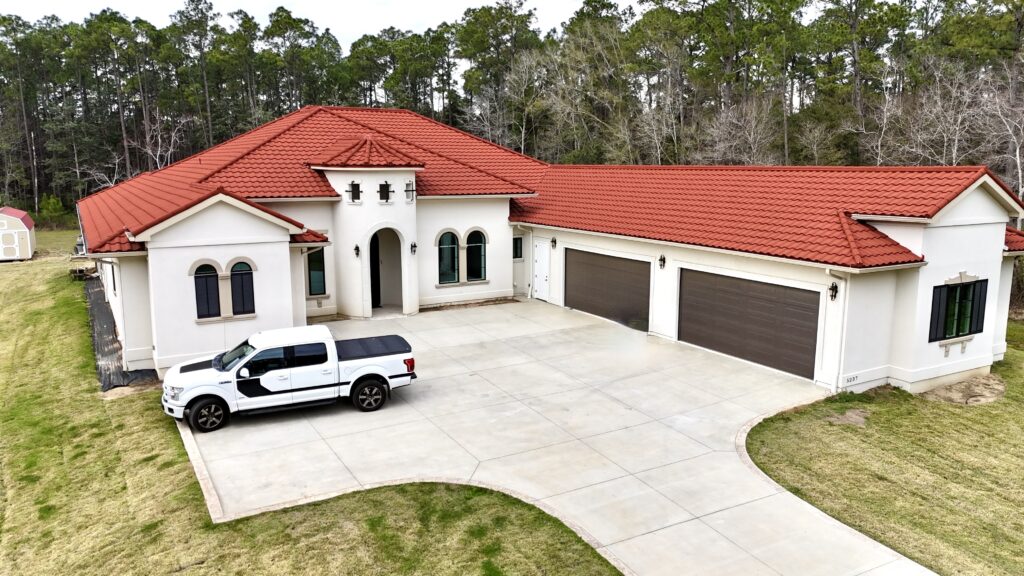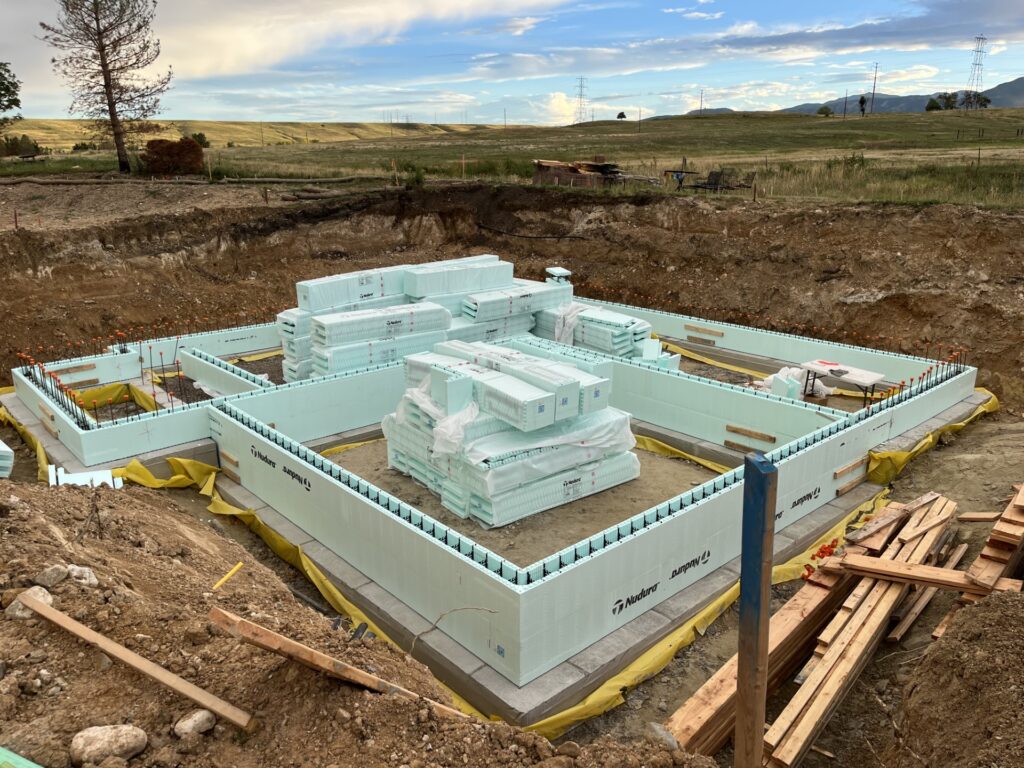When building a new home, every decision matters, from the location of the lot to the choice of finishes. Yet one of the most important decisions comes before flooring or countertops are ever considered: the choice of building materials. More homeowners today are turning away from traditional wood-frame construction and embracing Insulated Concrete Form (ICF) construction. The reasons go beyond durability and extend into energy efficiency, safety, sustainability, and long-term value. At Batten Builders, we specialize in both ICF and traditional construction, and we have seen firsthand why this building method is rapidly gaining popularity with families who want a home built to last.
The Evolution of Homebuilding
For generations, wood framing has been the go-to method for residential construction. It is familiar, widely used, and often perceived as cost-effective. But as building science evolves and homeowners face new challenges, from rising energy costs to intensifying storms, many are reconsidering their options. Traditional methods may not always deliver the performance and protection that today’s families need.
ICF construction, though not new, has surged in popularity in recent years because it addresses many of these modern concerns. It combines the strength of reinforced concrete with the insulation of rigid foam, creating walls that are solid, energy-efficient, and highly resilient. This evolution in construction represents more than just a shift in materials; it represents a change in how we think about homes as long-term investments in safety, comfort, and sustainability.
The Unmatched Strength of ICF Homes
One of the most compelling reasons homeowners are choosing ICF construction is the strength it provides. ICF walls are made by stacking hollow foam blocks, reinforcing them with steel, and filling them with concrete. The result is a structure that is significantly stronger than traditional wood framing.
This strength makes ICF homes particularly appealing in areas prone to severe weather. Along the Gulf Coast, where hurricanes and tropical storms are a part of life, homeowners want the peace of mind that their homes can withstand high winds and flying debris. ICF walls can resist wind speeds that would devastate traditional homes, providing a safer environment for families. In a world where natural disasters are becoming more frequent and intense, the structural integrity of ICF construction offers an invaluable layer of security.
Energy Efficiency That Lasts
Another major factor driving the shift toward ICF homes is energy efficiency. The dual insulation of foam and concrete creates an airtight envelope that drastically reduces heat transfer. This means less energy is required to heat or cool the home, resulting in lower utility bills month after month.
Homeowners often notice that ICF homes maintain a more consistent indoor temperature compared to wood-frame structures. This not only saves money but also creates a more comfortable living environment year-round. In hot climates, ICF construction keeps the cool air in and the heat out, while in colder climates it provides warmth and protection against harsh outdoor conditions.
With energy costs rising and sustainability becoming a priority for many families, ICF homes offer an attractive solution that pays dividends over the long term.
A Sustainable Choice for the Future
Sustainability is more than just a buzzword. Homeowners today are increasingly conscious of their environmental impact, and building choices play a significant role in that. ICF construction contributes to sustainability in several ways.
By reducing energy consumption, ICF homes lower greenhouse gas emissions over their lifetime. The materials themselves are durable, meaning the home requires fewer repairs and replacements, reducing waste. Additionally, because ICF walls provide such strong insulation, they allow HVAC systems to run less frequently, extending the lifespan of these systems and further reducing resource use.
When combined with other sustainable practices, such as energy-efficient appliances or renewable energy systems, ICF homes can be a cornerstone of an eco-friendly lifestyle that benefits both the homeowner and the planet.
Comfort and Quiet That Make a Difference
While strength, efficiency, and sustainability are often the headline benefits of ICF construction, many homeowners also fall in love with the comfort these homes provide. ICF walls significantly reduce outside noise, creating a quiet indoor environment that enhances quality of life.
In bustling neighborhoods, near highways, or even in coastal areas with constant wind, this noise reduction becomes a daily benefit. Families can enjoy peace inside their homes, free from the distractions of the outside world. Combined with consistent indoor temperatures and better air quality, the comfort factor makes ICF homes stand out as places truly designed for living well.
Cost Considerations and Long-Term Value
It is true that ICF construction often carries a higher upfront cost compared to traditional wood framing. However, this initial investment is offset by the long-term savings and value it provides. Lower energy bills, reduced maintenance, and increased durability all contribute to making ICF homes more cost-effective over time.
Additionally, the growing demand for sustainable, storm-resistant homes means that ICF properties may hold or even increase their resale value compared to traditionally built homes. For homeowners who view their house as both a sanctuary and a financial investment, ICF construction offers long-term advantages that are difficult to match with other methods.
Flexibility in Design
Some homeowners worry that choosing ICF will limit their design options. In reality, ICF construction is remarkably versatile. From traditional styles to modern architecture, ICF walls can be finished with nearly any exterior or interior treatment. Homeowners can enjoy the aesthetic they want without sacrificing performance.
At Batten Builders, we work closely with clients to ensure that the design of their home reflects their vision while taking full advantage of the benefits of ICF construction. Whether it is a cozy family home or a contemporary showpiece, ICF adapts beautifully to different architectural styles.
Why Batten Builders Leads in ICF Construction
Choosing the right construction method is important, but choosing the right builder is just as critical. At Batten Builders, we combine expertise in ICF construction with a commitment to craftsmanship and client satisfaction. We understand the unique demands of building along the Gulf Coast and bring that knowledge to every project.
Our team not only delivers structurally sound, energy-efficient homes but also ensures that each build reflects the homeowner’s personality, lifestyle, and goals. By blending innovative building methods with attention to detail, we create homes that are as beautiful as they are resilient.
Conclusion
As more homeowners look for strength, efficiency, and sustainability in their homes, ICF construction is becoming the clear choice. It offers unmatched protection from the elements, long-term energy savings, environmental responsibility, and comfort that goes beyond what traditional methods can provide. While the initial investment may be higher, the value it delivers over a lifetime makes it one of the smartest decisions a homeowner can make.
At Batten Builders, we are proud to be at the forefront of this shift, helping families build homes that are not only designed for today but built to endure tomorrow. For those who want a house that combines safety, efficiency, and style, ICF construction is the future, and the future is here now.





